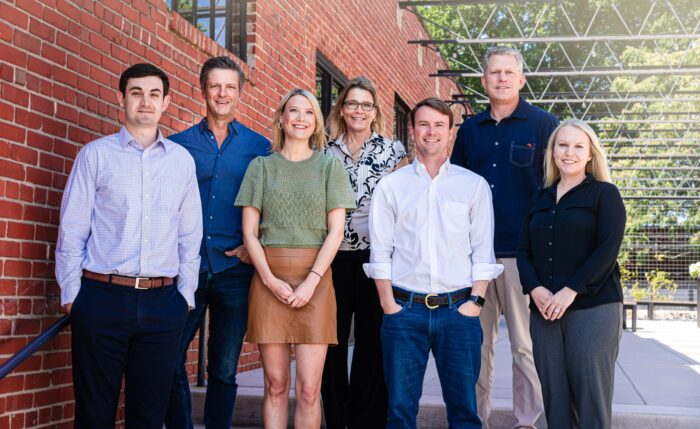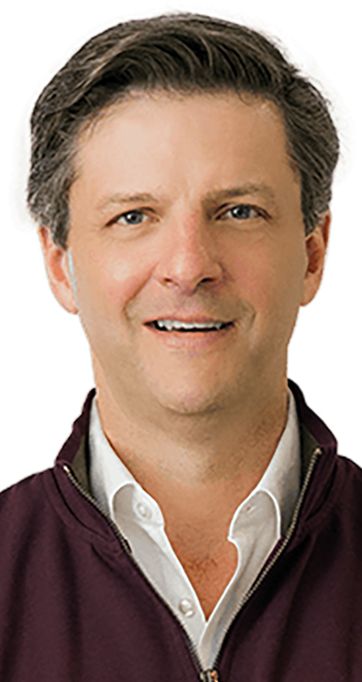
The Blue Heron team includes co-founders Tom Benedetti (second from left) and Andrew Tichenor (second from right). Photo courtesy Blue Heron.
A Scott’s Addition-based private equity firm has just capped off its biggest investment fund to date.
Blue Heron Capital recently closed out its third fund since its inception 10 years ago, raising $102 million for its Blue Heron Capital Fund III.
It’s a big jump from the seven-person firm’s previous two funds, which gathered around $25 million and $32 million in investor capital, respectively.
With a new, much larger pool to work with, Tom Benedetti, a Blue Heron co-founder and managing partner, said the firm has been quick to deploy Fund III by sticking to its pattern of buying into mainly healthcare and software-related companies in need of growth capital.
“We made five investments out of the (third) fund even before the close,” Benedetti said.
Blue Heron began raising Fund III in spring 2022 with a target of $100 million. Benedetti said the fund was “oversubscribed” due to excess interest from investors, so it upped the cap an extra $2 million before closing it out last month.
“It was a pretty exciting event considering it’s a tough fundraising environment these days with the uncertainty of the economy,” Benedetti said of being oversubscribed. “It’s a good validation that the strategy that we’re pursuing is a good one.”
Blue Heron’s funds look to invest in businesses with $3 million to $25 million in revenue and hold each investment for around five years. It raises the capital in part from what it calls operators, those who have previously built businesses and want to invest in other businesses while advising those businesses on growth plans.
About a third of Fund III has already been deployed, Benedetti said. One of those initial investments was Blue Heron’s participation in an $11 million raise for AnswersNow, a Richmond-based startup that makes a software program to facilitate virtual therapy sessions for people with autism.
This week it announced yet another Fund III investment, a participation in a $9 million raise by Motionworks, an Atlanta-based software company that helps businesses understand population movement.
Blue Heron counts about a dozen current investments from its second and third funds and has exited nine deals in its 10 years.
Its most recent exit, announced this week, was from its investment in STARC Systems, a Maine-based company that sells a modular, reusable barrier system for dirt, dust and debris on construction jobs involving venues that remain open during renovations.
Blue Heron made that $3 million investment in 2017. Terms of its exit were not disclosed, though it involved selling STARC to another private equity firm.
Benedetti said more than 100 investors bought into Fund III. They included many repeat investors from its previous funds. It also brought in money from a new avenue: seeking out large health systems as investors. Fund III’s investor list includes Orlando Health in Florida, St. Francis Health System in Oklahoma and Riverside Healthcare in Hampton Roads.
Benedetti said the health systems provide not only additional capital, but guidance on deals by being a barometer of what products and services are needed in the healthcare sector.
Bringing in health systems was also one of the ways Blue Heron worked around some of the skittishness among some investors generally, given the ups and downs of the economy of late, Benedetti said.
“In general, the uncertainty in the market gave a lot of institutions pause about whether or not they should invest in alternative assets, so that was a little bit of a struggle but we were able to overcome that,” he said.
The owners of some target companies also have shown some hesitancy in accepting deals, finding it hard to swallow that the pricing heyday of a couple years ago is coming to an end in a time of inflation and rising interest rates.
“There’s a little bit of a hangover of thinking their company is worth more than it is,” Benedetti said.
With some of those prices coming down and with more than three times the capital than its last fund, Benedetti said Fund III will allow the firm to buy into 10-12 companies compared to eight in the first fund and nine in the second.
“We can own more of these companies… and this time with more material ownership,” he said.

The Blue Heron team includes co-founders Tom Benedetti (second from left) and Andrew Tichenor (second from right). Photo courtesy Blue Heron.
A Scott’s Addition-based private equity firm has just capped off its biggest investment fund to date.
Blue Heron Capital recently closed out its third fund since its inception 10 years ago, raising $102 million for its Blue Heron Capital Fund III.
It’s a big jump from the seven-person firm’s previous two funds, which gathered around $25 million and $32 million in investor capital, respectively.
With a new, much larger pool to work with, Tom Benedetti, a Blue Heron co-founder and managing partner, said the firm has been quick to deploy Fund III by sticking to its pattern of buying into mainly healthcare and software-related companies in need of growth capital.
“We made five investments out of the (third) fund even before the close,” Benedetti said.
Blue Heron began raising Fund III in spring 2022 with a target of $100 million. Benedetti said the fund was “oversubscribed” due to excess interest from investors, so it upped the cap an extra $2 million before closing it out last month.
“It was a pretty exciting event considering it’s a tough fundraising environment these days with the uncertainty of the economy,” Benedetti said of being oversubscribed. “It’s a good validation that the strategy that we’re pursuing is a good one.”
Blue Heron’s funds look to invest in businesses with $3 million to $25 million in revenue and hold each investment for around five years. It raises the capital in part from what it calls operators, those who have previously built businesses and want to invest in other businesses while advising those businesses on growth plans.
About a third of Fund III has already been deployed, Benedetti said. One of those initial investments was Blue Heron’s participation in an $11 million raise for AnswersNow, a Richmond-based startup that makes a software program to facilitate virtual therapy sessions for people with autism.
This week it announced yet another Fund III investment, a participation in a $9 million raise by Motionworks, an Atlanta-based software company that helps businesses understand population movement.
Blue Heron counts about a dozen current investments from its second and third funds and has exited nine deals in its 10 years.
Its most recent exit, announced this week, was from its investment in STARC Systems, a Maine-based company that sells a modular, reusable barrier system for dirt, dust and debris on construction jobs involving venues that remain open during renovations.
Blue Heron made that $3 million investment in 2017. Terms of its exit were not disclosed, though it involved selling STARC to another private equity firm.
Benedetti said more than 100 investors bought into Fund III. They included many repeat investors from its previous funds. It also brought in money from a new avenue: seeking out large health systems as investors. Fund III’s investor list includes Orlando Health in Florida, St. Francis Health System in Oklahoma and Riverside Healthcare in Hampton Roads.
Benedetti said the health systems provide not only additional capital, but guidance on deals by being a barometer of what products and services are needed in the healthcare sector.
Bringing in health systems was also one of the ways Blue Heron worked around some of the skittishness among some investors generally, given the ups and downs of the economy of late, Benedetti said.
“In general, the uncertainty in the market gave a lot of institutions pause about whether or not they should invest in alternative assets, so that was a little bit of a struggle but we were able to overcome that,” he said.
The owners of some target companies also have shown some hesitancy in accepting deals, finding it hard to swallow that the pricing heyday of a couple years ago is coming to an end in a time of inflation and rising interest rates.
“There’s a little bit of a hangover of thinking their company is worth more than it is,” Benedetti said.
With some of those prices coming down and with more than three times the capital than its last fund, Benedetti said Fund III will allow the firm to buy into 10-12 companies compared to eight in the first fund and nine in the second.
“We can own more of these companies… and this time with more material ownership,” he said.
